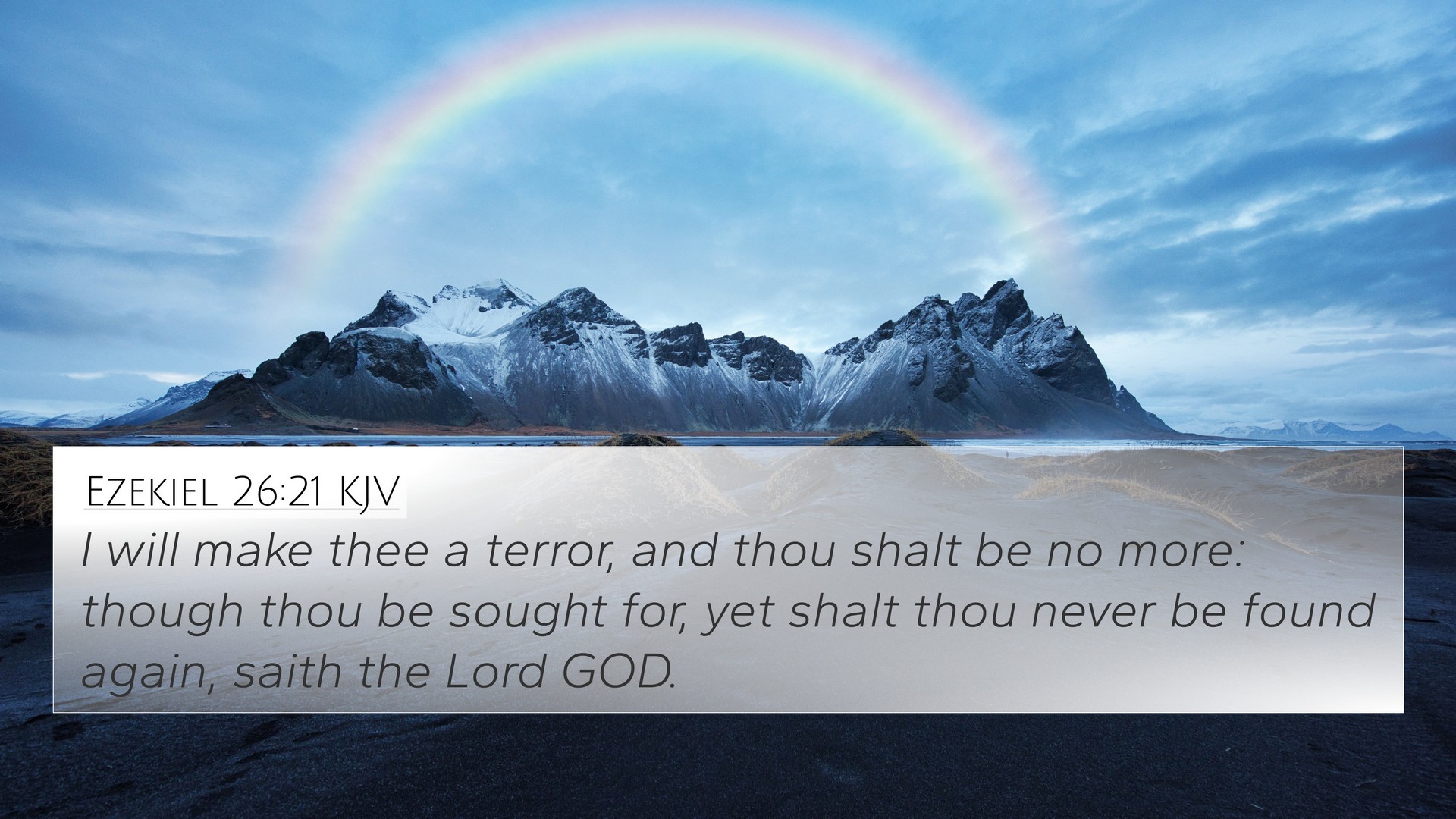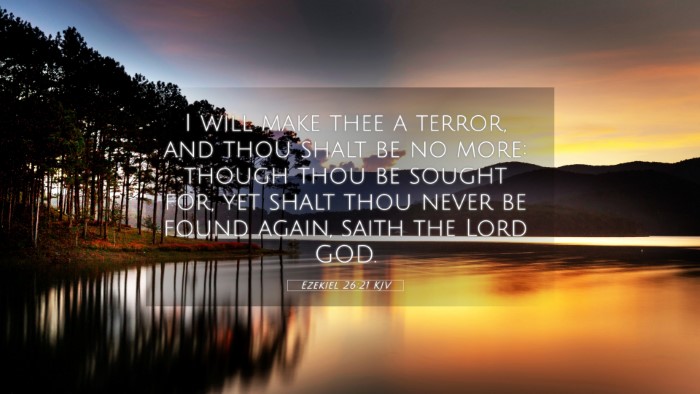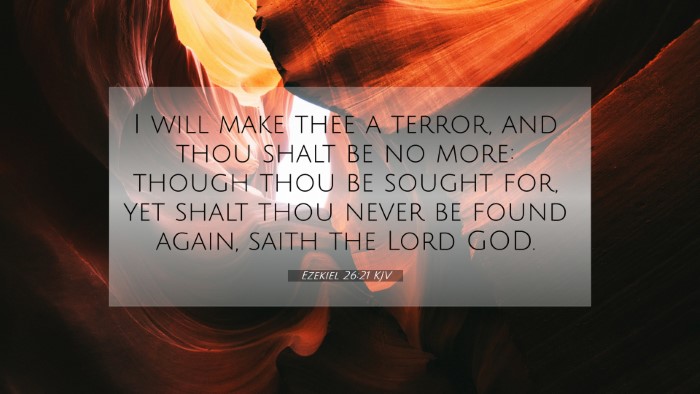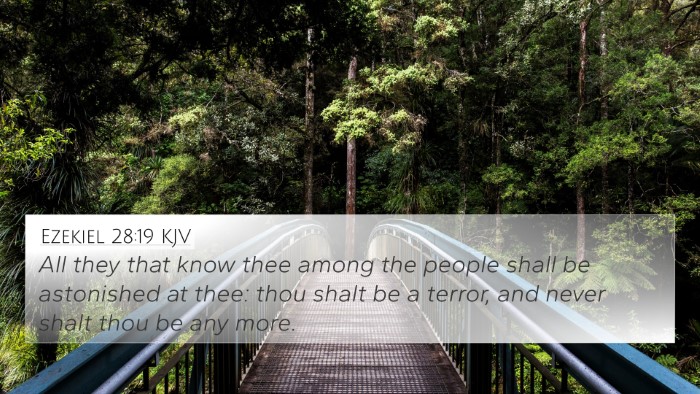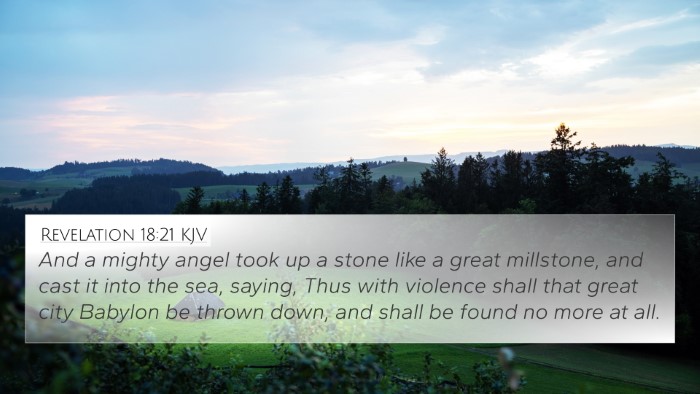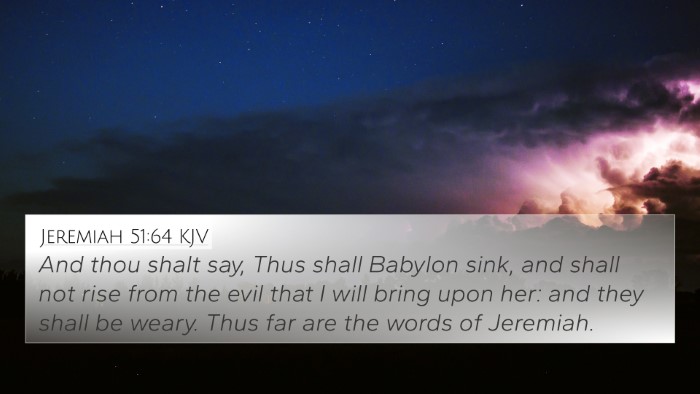Ezekiel 26:21 - Summary and Interpretation
Ezekiel 26:21 states, "I will make you a terror, and you shall be no more; though you were sought for, yet you shall never be found again, declares the Lord God." This prophetic verse conveys a powerful message of judgment against the city of Tyre, foreshadowing the complete devastation that would come upon it due to its pride and opposition to God.
Contextual Background
Ezekiel prophesies during a critical period in Israel's history, marked by the Babylonian conquest and the subsequent need for judgment against surrounding nations that have rejoiced at Israel's downfall. Tyre, a prominent Phoenician city, was known for its wealth and mercantilism, which led to arrogance and hostility towards God's people. The city had aligned itself against God's will, making it a target for prophetic judgment.
Interpretation Insights
-
Matthew Henry's Commentary: Henry asserts that the pronouncement of Tyre's terror and desolation symbolizes the eventual futility of earthly powers against divine judgment. The verse illustrates how the pride of nations leads to their downfall.
-
Albert Barnes's Notes: Barnes highlights that this destruction serves as a warning to others who oppose God. He emphasizes that God’s decrees are irreversible, and Tyre's complete eradication reflects God's sovereignty over nations.
-
Adam Clarke's Commentary: Clarke notes that the phrase "you shall be no more" indicates total annihilation, stressing the permanence of God’s judgment. He elaborates on how Tyre’s reputation will fade entirely, ensuring that future generations will not remember its former glory.
Thematic Cross-Referencing
This verse resonates with various other biblical themes, notably the consequences of pride and rebellion against God. Here are some cross-references:
- Isaiah 23:1-18: A prophecy against Tyre, indicating its downfall and the vanity of its riches.
- Jeremiah 25:22: Mention of the kingdoms of Tyre and Sidon as part of God’s judgment on nations.
- Ezekiel 27:32-36: The lament for Tyre unveils God's judgment and the loss of its economic power.
- Revelation 18:17-19: The fall of Babylon reflects similar themes of divine retribution against prideful cities.
- Proverbs 16:18: "Pride goes before destruction," encapsulating the moral of Tyre’s fate.
- Obadiah 1:3-4: Explores the themes of pride leading to downfall, akin to Tyre's demise.
- Matthew 24:2: Jesus foretells the destruction of the Temple, paralleling God's judgment on prideful edifices.
Understanding the Implications
The pronouncement in Ezekiel 26:21 carries profound implications for understanding God's interactions with nations and individuals alike. It serves as a reminder that:
- The disregard for God's will leads to inevitable consequences.
- Divine judgment is not limited to individuals but extends to entire nations.
- The history of nations serves as a lesson in humility and obedience to God’s will.
Reflecting on Judgment and Mercy
The relationship between God’s judgment and His mercy is a recurrent theme throughout the Bible. While Tyre’s destruction is a portrayal of divine retribution, it also reflects the opportunity provided to repent. As believers today, we can interpret this as a call to humility and submission to God, avoiding the fate of pride.
Conclusion
Ezekiel 26:21 serves as a stark reminder of the fleeting nature of power and the certainty of God’s judgment. For anyone seeking a deeper understanding of biblical themes and connections between verses, this passage underscores the importance of aligning oneself with God’s will and the consequences of failure to do so.
Tools for Deeper Study
Engaging with Scripture can be made easier through various tools:
- Bible concordance for locating terms related to judgment and mercy.
- Bible cross-reference guide for understanding relationships between verses.
- Cross-reference Bible study methods to analyze themes.
- Bible reference resources for deeper thematic studies relating to Tyre and its judgment.
Encouragement for Further Exploration
Explore the rich tapestry of Scripture using cross-referencing methods. By identifying connections between the Old and New Testament, as well as within different books, believers can deepen their understanding of God's overarching plan for redemption and judgment.
Standing in Awe of God's Word
As we reflect on Ezekiel 26:21 and its implications, remember that God’s Word is alive and relevant. Our exploration into cross-referenced themes and judgments encourages us to remain vigilant, learning from the past as we nurture our relationship with Him.
